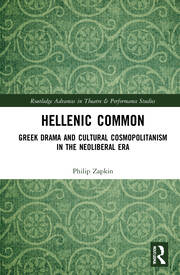1st Edition
Hellenic Common Greek Drama and Cultural Cosmopolitanism in the Neoliberal Era
Hellenic Common argues that theatrical adaptations of Greek tragedy exemplify the functioning of a cosmopolitan cultural commonwealth.
Analyzing plays by Femi Osofisan, Moira Buffini, Marina Carr, Colin Teevan, and Yael Farber, this book shows how contemporary adapters draw tragic and mythic material from a cultural common and remake those stories for modern audiences. Phillip Zapkin theorizes a political economy of adaptation, combining both a formal reading of adaptation as an aesthetic practice and a political reading of adaptation as a form of resistance. Drawing an ethical centre from Kwame Anthony Appiah’s work on cosmopolitanism and Michael Hardt and Antonio Negri’s theory of the common, Hellenic Common argues that Attic tragedy forms a cultural commonwealth from which dramatists the world over can rework, reimagine, and restage materials to envision aspirational new worlds through the arts.
This study will be of great interest to students and scholars of drama, adaptation studies, literature, and neoliberalism.
Acknowledgements
Introduction: Buying Piraeus, Owning Greece
1.1 A Very Brief History of Neoliberalism
1.2 McTheatre: Neoliberalism on Stage
1.3 Adaptation, Theatre, and Resistance to Neoliberal Hegemony
1.4 The Cultural Commons
1.5 Chapter Summaries
1.6 Conclusion
1.7 Works Cited
Chapter I: Adaptation: Shared Cultural Myths
2.1 The Field of Adaptation
2.2 The Political Economy of Adaptation
2.3 Why the Greeks in the Twentieth and Twenty-First Centuries?
2.4 Global Greeks?
2.5 Adaptation’s Cosmopolitan Political Potential
2.6 Conclusion
2.7 Works Cited
Chapter II: Economic (Neo)Colonialism: Exploitation Makes Globalization Go ‘Round
3.1 A Global Economy
3.2 Economic Anti-Colonialism: Protest in Femi Osofisan’s Women of Owu
3.3 Art and Culture as Survival Tools
3.4 The God of Profit: Nation Building and Global Economics in Moira Buffini’s Welcome to Thebes
3.5 Violence and Disaster Capitalism
3.6 Politics of Disavowal: Neoliberal Rhetoric and Results
3.7 Conclusion
3.8 Works Cited
Chapter III: …And Their Families: Neoliberal Family and the Dissolution of the Social
4.1 Family and the Neoliberal Paradox
4.2 Competing Models of Family in Marina Carr’s By the Bog of Cats
4.3 Contradictions to Neoliberal Ideals: Travellers and Domestic Labor
4.4 Breaking Down Society, Building Society Through Theatre
4.5 Conclusion
4.6 Works Cited
Chapter IV Korinthiazomai: Rewriting Desire and Perverse Enjoyment
5.1 The Psychology of Neoliberalism
5.2 New Plays from Old Fragments
5.3 Commodified Society: Sex, Religion, and Family
5.4 Alcmaeon’s Symptom
5.5 Creon’s Obsession
5.6 God from the Law
5.7 Conclusion
5.8 Works Cited
Chapter V Ubuntu: Building a Common World
6.1 Cosmopolitan Ethics
6.2 Molora and Its Classical Intertexts
6.3 Molora and the Truth and Reconciliation Commission
6.4 African Languages and Performance Forms
6.5 The Humane Power of the Xhosa Chorus
6.6 Conclusion
6.7 Works Cited
Conclusion Buying Greece: Or, You Get What You Pay For
7.1 Theatre Takes on Culture
7.2 Theatre Takes on Capitalism
7.3 Works Cited
Biography
Phillip Zapkin is Assistant Teaching Professor of English at Pennsylvania State University, USA.
''With Hellenic Common Zapkin offers a timely, perceptive, and cogent analysis of the use of ancient Athenian drama to challenge notions of ownership (especially of culture), globalized economics, and the reduction of all relationships to transactional. The politics of theatrical adaptation play a central role in resistance to both neoliberal models of theatrical production and the expansion of market ideology across the social spectrum, using adaptation of Greek tragedy to critique lived realities, from the destructive effect of Thatcherite policy on Irish families through the unifying application of Ubuntu in post-apartheid South Africa. Zapkin offers a model for understanding how theatre artists use ancient material to understand the contemporary world, and, what’s more, offer paradigms for change.'' Kevin Wetmore, Professor of Theatre Arts, College of Communication and Fine Arts, LA
''Hellenic Common is important not just because it locates a rich seam of recent theatrical adaptations of Greek tragedy that critique contemporary neoliberalism, but more so because Zapkin makes the persuasive case that the practice of adaptation itself harbors great potential for resisting the neoliberal impulses that these plays individually take on. A generative and insightful study.'' Ryan Claycomb, Professor of English, College of Liberal Arts, Colorado State University




